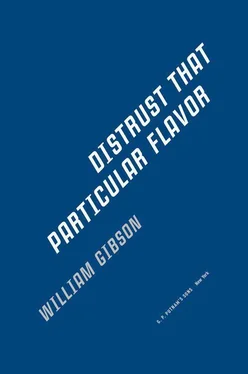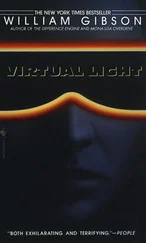I knew a man once whose teen years had been L.A., jazz, the Forties. He spoke of afternoons he’d spent, utterly transported, playing 78-rpm recordings, “worn down white” with repeated applications of a sharp steel stylus. That is, the shellac that carried the grooves on these originally black records was plain gone: What he must have been listening to could only have been the faintest approximations of the original sound. (Rationing affected steel phonograph needles, he told me, desperate hipsters resorted to the spikes of the larger cactuses.)
That man heard that music.
I first heard the Rolling Stones on a battery-powered, basketball-shaped, pigskin-covered miniature phonograph of French manufacture — a piece of low tech as radical in its day as it is now obscure. Radical in that it enabled the teenage owner to transport LP records and the intoxicant of choice to suitably private locations — the boonies.
This constituted an entirely new way to listen to the music of choice. “Choice” being the key word. The revolutionary potential of the D-cell record player wasn’t substantially bettered until the advent of the Walkman, which allows us to integrate the music of choice with virtually any landscape.
The Walkman changed the way we understand cities.
I first heard Joy Division on a Walkman, and I remain unable to separate the experience of the music’s bleak majesty from the first heady discovery of the pleasures of musically encapsulated fast-forward urban motion.
In the Seventies, the Net writhed with growth. Gaps began to close. A paradox became increasingly evident: While artists needed the Net in order to reach a mass audience, it seemed to be the gaps through which the best art emerged, at least initially.
I am, by trade, a science-fiction writer. That is, the fiction I’ve written so far has arrived at the point of consumption via a marketing mechanism called “science fiction.” During the past twenty years the Net has closed around mass-market publishing — and science fiction — as smoothly as it closed around the music industry and everything else.
As a science-fiction writer, I’m sometimes asked whether or not I think the Net is a good thing. That’s like being asked if being human is a good thing. As for being a human being a good thing or not, I can’t say — this has been referred to as the Postmodern Condition.
In any case it sometimes looks to me as though lots of us will eventually have a basis for comparison, by virtue of no longer being quite human at all, thank you.
Meanwhile, in my front room, the family media node is in metastasis, sprouting CDs, joysticks, you name it. My kids, like Mr. Otomo’s, cluster like flies.
THE OTHER THING they ask you when you’re a science-fiction writer is, “What do you think will happen?”
The day I reply with anything other than a qualified “I haven’t got a clue,” please shoot me. While science fiction is sometimes good at predicting things, it’s seldom good at predicting what those things might actually do to us. For example, television, staple window dressing for hundreds of stories from the Twenties through the Forties, was usually presented as a mode of personal communication. Nobody predicted commercials, Hollywood Squares , or heavy-metal music videos.
With that disclaimer firmly in place, I predict the family media node growing into a trickier and more unified lump. The distinction among television, CD player, and computer seems particularly arbitrary these days, a tired scam designed to support the robots who solder circuit boards. But as to what your integrated Net Node will actually be able to do for you one day, my best bet is that the words for it haven’t been invented yet.
Example. A BBC executive working on another vision of “interactive television” offered me a tour of a small research facility in San Francisco. He was interested in having me “do” something with this new technology: The lab we visited was devoted to… well, there weren’t verbs. I looked at things, watched consoles as they were poked and prodded, and nobody there, it seemed, could even begin to explain what it was I might be doing if I were to, uh, do one of these projects, whatever it was. It wasn’t writing, and it wasn’t directing. It was definitely something, though, and they were certainly keen to do it, but they needed those verbs.
Another example. A week later I found myself in an FX compound situated off a quiet back street in North Hollywood, experiencing serious future-shock frisson. My hosts — young, fast, and scientific to the bone — had developed a real-time video puppet, a slack-faced Max Headroom suspended in the imaginary space behind a television screen. Invited to put my hand in a waldo that looked vaguely like a gyroscope, I caused this sleeping golem to twitch and shiver, and my own hair to stand on end. On the way out, I was given a tape of the thing being manipulated by a professional movie puppeteer. It looks a lot more natural than I ever do on television, but what are the verbs for what those young fast fellows were doing?
We hurtle toward an imaginary vortex, the century’s end.…
HE GETS UP in the morning and watches ten minutes of MuchMusic while the water boils for coffee. The kids aren’t up yet because it’s not quite time for Dinosaurs . MuchMusic is Canada’s approximation of MTV. In the morning he usually watches it with the sound off, unless they show a video from Quebec, in which case he listens because he doesn’t understand French.
Because he doesn’t like the Net to gnaw at the remnants of the night’s dreams. Not until he’s ready for it to anyway.

These pieces aren’t presented in chronological order, particularly, but this is quite an early example, and the product of considerable discomfort around the idea of just how one does this sort of thing when asked. The very fact of the commission was unsettling, I recall.
What I don’t recall, quite, is what I would have imagined “the Net” to be, at that point, however freely I tossed the term around for Rolling Stone. I knew not Net, when I wrote this, though I had friends who talked Net, and fairly constantly. I communicated with them via fax, yards and yards of slippery, oddly scented photosensitive paper, longer docs coming or going via FedEx, either as printouts or on floppies. So I think it’s safe to say that I was pretending to know what “the Net” might be, when I wrote this. Was it something to do with this “email” a few people seemed to know how to send between distant computers, or was it some more abstract expression of the totality of cyberspace? I think I opted for the latter, but phrased things in such a way as might seem I was better acquainted with the former than I actually was.
If I had seen a computer with an Internet connection, at that point, I hadn’t been aware of it. The first I remember seeing was my own, and that was quite a few years later; I’d waited until they’d made it very simple, which I’d rightly assumed they would, eventually.
But I did own a Rocket Radio when I was a kid, and I did once infer the existence of the newfangled tape cassette from a single brown and tangled roadside skein.
The Datsun B-210 with rust-holes in the floor was my own, parked outside as I wrote.
 Читать дальше
Читать дальше











